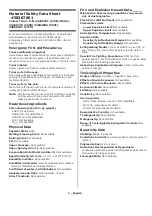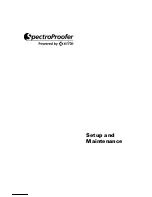
Laptop battery handling instructions
1. Fully charge your battery prior to initial use.
2. Exercise your battery to reach peak performance. It is common to need to
charge and discharge new batteries (through use) up to 4 times to achieving
maximum capacity.
3. When charging the battery for the first time your computer may indicate
that charging is complete after a very short time. This is a normal. Exercising
your battery will solve this issue.
4. You should regularly charge and discharge your battery. Storing batteries
for prolonged periods will result in decreased runtime.
5. It is normal for a battery to become warm during charging and discharging.
6. Even a fully charged battery will eventually lose its power if unused. It may
therefore be necessary to recharge the battery after an extended period of
storage or non-use.
How long will a new battery power a laptop?
1. Actual battery run-time depends upon the power demands made by the
equipment it is used with. In the case of a notebook computer, the use of the
monitor, the hard drive and other peripherals results in an additional drain on
the battery.
2. Total run-time of battery is also heavily dependent upon the design of the
equipment. Generally, our new high-capacity battery will run at least as long
(and usually 20-50% longer) as your old battery did when it was new.
What is the life span of the new battery?
1. The life of a rechargeable Li-ion battery is approximately 500 charge-
discharge cycles. This results in 1- 3 years of battery life for the average user.
2. As the rechargeable battery begins to die, you will notice a decline in
run time.
3. When a battery that originally operated the notebook for 2-3 hours is only
supplying an hour’s worth of use, it’s time for a new one.
How are batteries rated?
(What are Volts and Amps)
1. There are 2 ratings on every battery, volts and amp-hours (AH or mAH).
2. Accessory Power batteries meet or exceed OEM mAh and capacity
specifications.
3. Higher mAh rating is indicative of a longer run-time (higher capacity) and
will not cause any incompatibilities.
How can I maximize battery performance?
1. Clean dirty battery contacts with a cotton swab and alcohol. This helps
maintain a good connection between the battery and your Laptop.
2. Exercise your battery. Do not leave your battery dormant for long periods
of time. We recommend using the battery at least once every 2 to 3 weeks.
3. When running on AC most of the time, it is best not to keep your best
battery in your notebook. That battery will be charged and discharged many
more times than needed and that will shorten its life. When using AC power
regularly it is better to use an older, short run-time battery.
4. If you don’t plan on using the battery for a month or more, we recommend
storing it in a clean, dry, cool place at room temperature but away from heat
and metal objects. Li-ion batteries will self-discharge during storage.
5. To get maximum performance from your battery, fully optimize the
notebook’s power management features prior to use. Power management
is a trade-off of battery power conservation in exchange for computer
performance.
6. The power management system conserves battery power by setting the
processor to run at a slower speed, dimming the screen, spinning down the
hard drive when it’s not in use, and causing the machine to go into sleep
mode when inactive. Your notebook user’s guide will provide further
information relating to specific power management features.
FREE PRODUCT REGISTRATION
Protect your investment by registering your product now and
receive full warranty coverage and access to special offers.
www.AccessoryPower.com/warranty




















